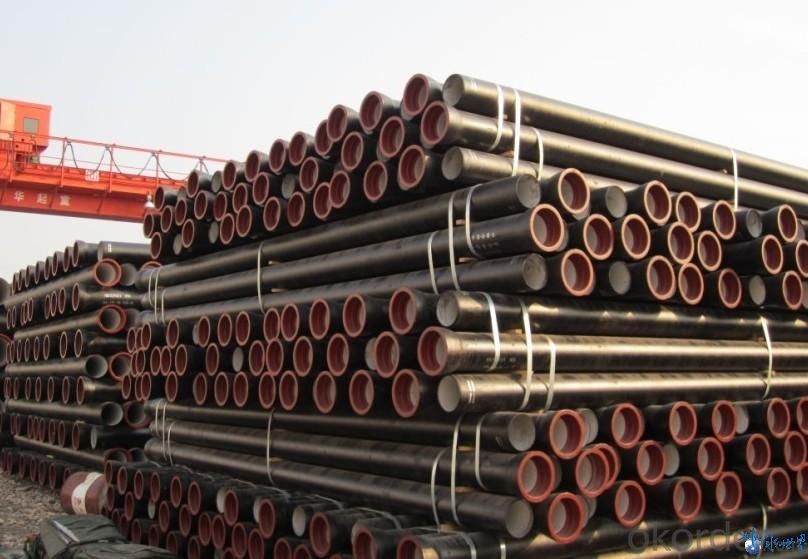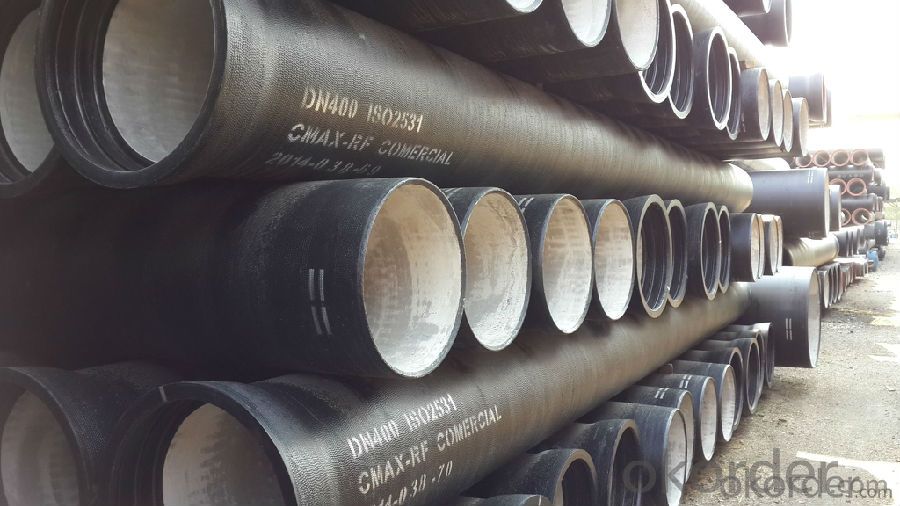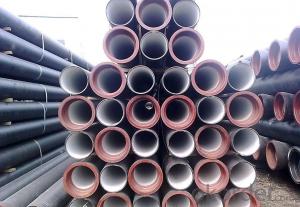Ductile Iron Pipe of China DN100-DN700 EN545/EN598/ISO2531 On Sale
- Loading Port:
- China main port
- Payment Terms:
- TT or LC
- Min Order Qty:
- 25 m.t.
- Supply Capability:
- 200000 m.t./month
OKorder Service Pledge
OKorder Financial Service
You Might Also Like
1,Ductile Iron Pipe Description :
1) Pipes confirm to ISO2531,K9 class,T type joint,6m long,with inside cements lining conform to ISO4179, outside Zinc spraying(130g/m2) and bitumen coating(70μm) conform to ISO8179.
2) Pipe ends: Spigot and socket ends, with 100% SBR rubber gaskets accoding to ISO4633
3) we can do third party inspection according to customer's request.
4) Our products have been sold to many international market,such as Middle East and South East Asia and Africa.
2,Main Features of the Ductile Iron Pipe:
·High yield strength
·High tensile Strength
·High corrosion resistance
·Pressure Resistence
·Anti-corrosion
·Installation is convenient
·Satisfy the highest hygienic standards
3,Ductile Iron Pipe Images:


4. Ductile Iron Pipe Specification
Place of Origin: China (Mainland)
Model Number: DN80-1600 Length: 6M/5.7M/NEGOTIATED Standard: ISO2531 / EN545
Application: Potable/Sewage Water
Diameter: DN80-1600
Shape: Round
Hardness: 230 Pipe
Wall Thickness: standerd
Pull Strength: 420
Yield (≥ MPa): 300
Material: Ductile Iron water ductile iron pipe: SO2531 / EN545 DI pipe
Packaging & Delivery
Delivery Detail: 30-45 days
Specifications
ductile iron pipe:
1. DN80-DN1600mm (T-Type, Class K9)
2.effective length 6m/pc
3.comply with ISO2531/EN545/EN598
Internal lining: ductile iron pipes shall have an internal cement mortar lining in acc with ISO4179.
External coating: ductile iron pipes shall be externally coated with metallic zinc spray plus a further layer of resin painting to ISO8179.
Gasket: 100% SBR/NBR/EPDM rubber gasket in accordance with ISO4633.
Packing: ductile iron pipes from DN100 to DN300 be bundled with steel belts, others are in bulk.
Payment term: L/C, T/T.
Packing: In bulk vessel or in container
5.FAQ:
We have organized several common questions for our clients,may help you sincerely:
1.Q: Why would you choose ductile iron pipe rather than other pipe materials?
A:The reasons are obvious for that not only ductile iron pipe possesses the inherent strength and flexibility of ductile iron, combined with proven corrosion protection systems, but also the cost savings can be achieved from design to installation and commissioning.
2.Q:Why can you guarantee the inner of pipes can’t be corroded?
A: High alumina cement mortar lining and sulphate-resistant cement mortar lining. These two special linings are applicable to inner anti-corrosion for sewage pipes, improving resistance to erosion of the sewage components.
- Q:What are the environmental benefits of using ductile iron pipe?
- Ductile iron pipe offers several environmental benefits. Firstly, it is made from recycled materials, reducing the need for extracting new resources. Secondly, it has a long lifespan, typically lasting over 100 years, reducing the need for frequent replacements and minimizing waste. Additionally, ductile iron pipes have a low carbon footprint compared to other materials, contributing to lower greenhouse gas emissions. Lastly, these pipes have excellent corrosion resistance, reducing the risk of leaks and contamination of water sources, thus protecting the environment.
- Q:Can ductile iron pipes be used in nuclear power plants?
- Yes, ductile iron pipes can be used in nuclear power plants. Ductile iron is a type of cast iron that has improved flexibility and strength compared to traditional cast iron pipes. These pipes are known for their durability, corrosion resistance, and ability to withstand high pressure and temperature conditions. In nuclear power plants, where there is a need for a reliable and robust piping system to transport water, coolant, and other fluids, ductile iron pipes can be a suitable choice. However, it is important to note that the specific requirements and regulations of each nuclear power plant should be considered before selecting the pipe material. Proper testing, certification, and compliance with nuclear industry standards should be ensured to guarantee the safe and efficient operation of the power plant.
- Q:What new technologies are there for the installation of ductile iron pipes?
- Type W: type W tube in the same pipe with high strength, low noise, good fireproof performance, long service life, with the characteristics of flexibility and good seismic performance, but also has synchronous construction, utilization rate is high, easy to pipe, reducing the hydraulic test of pipeline clearing times, shorten the construction period to improve economic benefits. In addition, this type of interface with bolts in the lateral fastening, avoids the defects of socket flexible interface flange is easy to damage, close to the wall to the fixed bolt, has the advantages of simple operation, so in the selection of building drainage pipes and fittings, with strong competitiveness. In addition, because the length of W pipe is 3M, the number of intermediate joints is greatly reduced, and any length can be intercepted in accordance with the requirements, thereby greatly saving the pipe material, reducing consumption and cost. W type socket with stainless steel hoop rib clamp, lined with rubber ring flexible connection, seismic performance and good sealing performance, no leakage and allowed to swing in a certain range. Therefore, W tubes are widely used both at home and abroad.
- Q:Ductile iron pipe in the direction of it?
- The use of cast iron by adding more than 18 nodularizer, after centrifugal ductile cast iron machine high speed centrifugal cast pipe, called "ductile" (Ductile Cast Iron Pipes), referred to as ball pipe, ductile iron pipe and ductile iron pipe etc..
- Q:How are ductile iron pipes different from PVC pipes?
- Ductile iron pipes and PVC pipes are utilized extensively in plumbing and water distribution systems, but they differ significantly in terms of their composition and properties. Ductile iron pipes are crafted from a particular form of cast iron that contains graphite nodules, which provide the material with ductility and flexibility. Consequently, these pipes can endure high pressures and heavy loads without succumbing to breakage or cracking. Ductile iron pipes are renowned for their robustness and longevity, making them particularly suitable for underground applications and areas with substantial traffic. Conversely, PVC pipes are constructed from a plastic known as polyvinyl chloride. These pipes possess rigidity and lack the same level of strength as ductile iron pipes. PVC pipes are commonly employed in low-pressure scenarios, such as residential plumbing systems, irrigation, and drainage systems. These pipes are lightweight, easy to install, and resistant to corrosion, rendering them a favored option for residential and non-industrial purposes. The cost disparity between ductile iron pipes and PVC pipes represents another distinction. Due to higher material and production expenses, ductile iron pipes tend to be pricier. Conversely, PVC pipes are relatively inexpensive to manufacture, making them a cost-effective choice for numerous plumbing projects. In summary, the primary disparities between ductile iron pipes and PVC pipes involve their composition, strength, flexibility, and cost. Ductile iron pipes, formed from cast iron, are celebrated for their strength and durability, while PVC pipes, formed from plastic, are lighter and more cost-effective. The selection between these two types of pipes depends on the specific demands of the plumbing project, including pressure, load-bearing capacity, and budgetary considerations.
- Q:Are ductile iron pipes suitable for landfill leachate collection?
- Ductile iron pipes are indeed appropriate for collecting landfill leachate due to their excellent corrosion resistance, which is essential when dealing with corrosive substances present in the leachate. Additionally, these pipes possess remarkable strength and durability, enabling them to endure the pressure and stress exerted by the leachate collection system. Moreover, their ease of installation and maintenance is well-known, rendering them a pragmatic option for landfill leachate collection systems. In conclusion, ductile iron pipes possess the requisite properties and traits to efficiently and effectively gather landfill leachate.
- Q:How does ductile iron pipe perform in areas with high soil consolidation?
- Ductile iron pipe performs well in areas with high soil consolidation due to its inherent strength and durability. The pipe's flexibility allows it to withstand ground movement, settlement, and consolidation without compromising its structural integrity. Additionally, ductile iron is resistant to corrosion, making it a suitable choice for areas with varying soil conditions.
- Q:How can the ductile iron pipe elbow be fixed?
- The utility model relates to a groove connecting pipe which has the function of sealing and sealing, and mainly comprises three parts: a sealing rubber ring, a clamping band and a locking bolt. The inner rubber sealing ring is arranged on the outer side of the connecting pipe and is matched with the pre rolling groove, and then the outer ring is buckled on the rubber ring, and then can be fastened with two bolts. Because of the special sealing structure design of the rubber sealing ring and the clamp hoop, the groove connecting piece has good sealing property, and the sealing property is enhanced correspondingly with the increase of the fluid pressure in the pipe.
- Q:What is the weight of ductile iron pipe compared to other pipe materials?
- Ductile iron pipe is generally heavier compared to other pipe materials. Its weight can vary depending on the size and thickness of the pipe, but generally, ductile iron pipe is denser and has a higher weight per unit length compared to materials like PVC, HDPE, or steel. This higher weight of ductile iron pipe is primarily due to its composition, which includes iron and carbon, making it a sturdy and durable option for various piping applications.
- Q:How does ductile iron pipe perform in sandy or unstable soils?
- Ductile iron pipe performs well in sandy or unstable soils due to its inherent strength, durability, and flexibility. Its high tensile strength and resistance to deformation make it capable of withstanding the pressure exerted by the surrounding soil. Additionally, the material's ability to flex and absorb ground movements helps to minimize the risk of pipe failure or damage in unstable soil conditions. Overall, ductile iron pipe provides a reliable and long-lasting solution for transporting fluids in challenging soil environments.
1. Manufacturer Overview |
|
|---|---|
| Location | |
| Year Established | |
| Annual Output Value | |
| Main Markets | |
| Company Certifications | |
2. Manufacturer Certificates |
|
|---|---|
| a) Certification Name | |
| Range | |
| Reference | |
| Validity Period | |
3. Manufacturer Capability |
|
|---|---|
| a)Trade Capacity | |
| Nearest Port | |
| Export Percentage | |
| No.of Employees in Trade Department | |
| Language Spoken: | |
| b)Factory Information | |
| Factory Size: | |
| No. of Production Lines | |
| Contract Manufacturing | |
| Product Price Range | |
Send your message to us
Ductile Iron Pipe of China DN100-DN700 EN545/EN598/ISO2531 On Sale
- Loading Port:
- China main port
- Payment Terms:
- TT or LC
- Min Order Qty:
- 25 m.t.
- Supply Capability:
- 200000 m.t./month
OKorder Service Pledge
OKorder Financial Service
Similar products
New products
Hot products
Related keywords



























